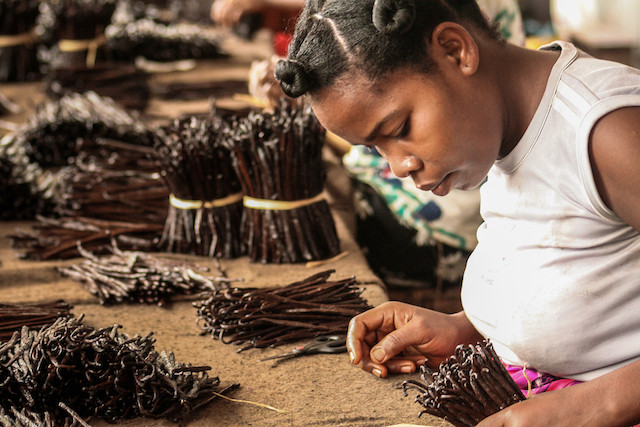For one, “there are no zebras there!” Rajabali’s link to Madagascar stretches back several generations when her great-grandparents emigrated to Madagascar from India following the Indo-Pakistani war of 1947. Although she was born in Paris and lives in Luxembourg, Rajabali lived in Madagascar from a young age until the age of 18 and to her, it remains “home”.
“We’ve a lot of natural resources. Just 20 minutes out of the capital you find places that aren’t exploited at all,” Rajabali said. “The people are always smiling. It’s good to live in Madagascar.”
While studying commerce in Paris, the expat kept her homesickness at bay by cooking the kinds of food she ate growing up, a fusion of Indian, Indonesian and African cuisine.
“But, in the shops,I could only ever find the same big brand spices. What is more, many of them were diluted with other ingredients.” The experience planted the seed of an idea and in 2018, Rajabali launched The Spice Collection, selling around 30 different exotic spices in fun, elegant tins.
Of the selection, 70% derive from Madagascar. “I can be sure of this because I regularly return and have an association which regroups small producers. It helps the local population with good infrastructure.” Furthermore, for each spice sold, Rajabali’s association plants a tree in Madagascar. “We’ve planted around 6,000 trees since we began.”

Social entrepreneur Roxane Rajabali, pictured, lived in Madagascar from a young age until the age of 18 and to her, it remains “home”. Photo: Jan Hanrion
Biodiversity
In the past, much of the island was covered with evergreen and deciduous forest. Even though Madagascar retains a huge diversity of flora, deforestation for rice fields, fuel and timber has destroyed over 90% of its original forests. The remaining flora and fauna are highly vulnerable to extreme weather events such as cyclones, floods and droughts. Widespread corruption further compounds the issues facing the island nation. In 2019, Transparency International ranked the country 158 out of 180 countries with a score of 24/100 in its corruption perceptions index.
With corruption, comes poverty. In 2019, three-quarters of the population was thought to be living below the poverty line. Emigration offers one way out and France, which colonised Madagascar in 1896, has a significant diaspora.
Luxembourg appears to be less sought-after, with 72 people holding Madagascan passports living there at the beginning of 2019, according to Statec. In past years, a friendly football match was organised between the two countries. While Madagascar has its own unique popular sports, like tolon’omby (zebu cattle wrestling), its national sport is rugby. Introduced in the 1890s by French railroad workers, today there are over 161 registered clubs and its national team, the Makis, reached the finals of the Africa Cup of Nations a handful of times.

Luxembourg cardiologist Jeff Erpelding cofounded Tsara Fo to boost practical experience in medical professions in Madagascar. Photo: Mike Zenari
Health connections
Another vestige from the French colony was the health system, though it is beleaguered by widespread corruption, according to Luxembourg cardiologist Jeff Erpelding. “Madagascar was the reference for medicine in the Indian Ocean,” he said. “Happily, it became independent in 1958, but corruption was primordial. It’s a very big problem.” In 2007, Erpelding cofounded Tsara Fo, Malagasy for “remember”, to provide practical experience and oversee good health practises in the profession. Since 2011, a delegation of health professionals from Tsara Fo has visited the same area every year. “Sometimes, we will have practitioners come to Luxembourg to get practical experience at the CHL or Esch hospitals.”
The cardiologist waxes lyrical about Madagascar’s beauty, diversity and plentiful resources some of which, like litchi, are sold in Luxembourg. “In a single day, you can cross three to four different climate zones.” At the same time, poverty is very present, and more than half the population lacks access to safe drinking water.
According to the World Bank, Madagascar has the world’s fourth highest rate of chronic malnutrition, with almost one child in two under five years of age suffering from stunting. “There’s real famine in the south. It’s the first time in my life that I saw kids with huge extended stomachs because of malnutrition,” the doctor said.
With November’s scheduled visit postponed thanks to covid-19 and the medical school closed, Erpelding is deeply concerned. He says the little finance trickling into the health system is directed into covid treatments before other pressing health concerns like malaria and cancer. “We will return as soon as possible.”
This article was first published in the October-November 2020 edition of Delano Magazine
